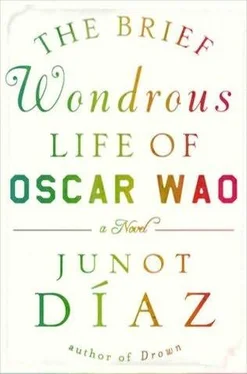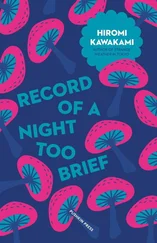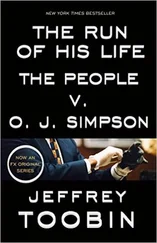But no, she doesn’t say a word about eating more plátanos. Instead, she takes your right hand and guides you. Your mom is rough in all things but this time she is gentle. You did not think her capable of it .
Do you feel that? she asks in her too-familiar raspy voice .
At first all you feel is the heat of her and the density of the tissue, like a bread that never stopped rising. She kneads your fingers into her. You’re as close as you’ve ever been and your breathing is what you hear .
Don’t you feel that? She turns toward you. Coño, muchacha, stop looking at me and feel.
So you close your eyes and your fingers are pushing down and you’re thinking of Helen Keller and how when you were little you wanted to be her except more nun-ish and then suddenly without warning you do feel something. A knot just beneath her skin, tight and secretive as a plot. And at that moment, for reasons you will never quite understand, you are overcome by the feeling, the premonition, that something in your life is about to change. You become light-headed and you can feel a throbbing in your blood, a beat, a rhythm, a drum. Bright lights zoom through you like photon torpedoes, like comets. You don’t know how or why you know this thing but you know it cannot be doubted. It is exhilarating. For as long as you’ve been alive you’ve had bruja ways; even your mother will begrudge you that much. Hija de Liborio she called you after you picked your tía’s winning numbers for her and you assumed Liborio was a relative. That was before Santo Domingo, before you knew about the Great Power of God .
I feel it, you say, too loudly. Lo siento .
And like that, everything changes. Before the winter is out the doctors remove that breast you were kneading, along with the axillary lymph node. Because of the operations she will have trouble lifting her arm over her head for the rest of her life. Her hair begins to fallout, and one day she pulls it all out herself and puts it inside a plastic bag. You change too. Not right away, but it happens. And it’s in that bathroom where it all begins. Where you begin .
A punk chick. That’s what I became. A Siouxsie and the Banshees-loving punk chick. The puertorican kids on the block couldn’t stop laughing when they saw my hair, they called me Blacula, and the morenos, they didn’t know what to say: they just called me devil-bitch. Yo, devil-bitch, yo, yo! My tía Rubelka thought it was some kind of mental illness. Hija, she said while frying pastelitos, maybe you need help . But my mother was the worst. It’s the last straw, she screamed. The. Last. Straw. But it always was with her. Mornings when I came downstairs she’d be in the kitchen making her coffee in la greca and listening to Radio WADO and when she saw me and my hair she’d get mad all over again, as if during the night she’d forgotten who I was. My mother was one of the tallest women in Paterson, and her anger was just as tall. It pincered you in its long arms, and if you showed any weakness you were finished. Que muchacha tan fea, she said in disgust, splashing the rest of her coffee in the sink. Fea’s become my new name. Nothing new, really. She’s been saying stuff like that all our lives. My mother would never win any awards, believe me. You could call her an absentee parent: if she wasn’t at work she was sleeping, and when she was around it seemed all she did was scream and hit. As kids, me and Oscar were more scared of our mother than we were of the dark or el cuco. She would hit us anywhere, in front of anyone, always free with the chanclas and the correa, but now with her cancer there’s not much she can do anymore. The last time she tried to whale on me it was because of my hair, but instead of cringing or running I punched her hand. It was a reflex more than anything, but once it happened I knew I couldn’t take it back, not ever, and so I just kept my fist clenched, waiting for whatever came next, for her to attack me with her teeth like she did to this one lady in the Pathmark. But she just stood there shaking, in her stupid wig and her stupid bata, with two huge foam prostheses in her bra, the smell of burning wig all around us. I almost felt sorry for her. This is how you treat your mother? she cried. And if I could have I would have broken the entire length of my life across her face, but instead I screamed back, And this is how you treat your daughter?
Things had been bad between us all year. How could they not have been? She was my Old World Dominican mother and I was her only daughter, the one she had raised up herself with the help of nobody, which meant it was her duty to keep me crushed under her heel. I was fourteen and desperate for my own patch of world that had nothing to do with her. I wanted the life that I used to see when I watched Big Blue Marble as a kid, the life that drove me to make pen pals and to take atlases home from school. The life that existed beyond Paterson, beyond my family, beyond Spanish. And as soon as she became sick I saw my chance, and I’m not going to pretend or apologize; I saw my chance and eventually I took it. If you didn’t grow up like I did then you don’t know and if you don’t know it’s probably better you don’t judge. You don’t know the hold our mothers have on us, even the ones that are never around—especially the ones that are never around. What it’s like to be the perfect Dominican daughter, which is just a nice way of saying a perfect Dominican slave. You don’t know what it’s like to grow up with a mother who never said a positive thing in her life, not about her children or the world, who was always suspicious, always tearing you down and splitting your dreams straight down the seams. When my first pen pal, Tomoko, stopped writing me after three letters she was the one who laughed: You think someone’s going to lose life writing to you? Of course I cried; I was eight and I had already planned that Tomoko and her family would adopt me. My mother of course saw clean into the marrow of those dreams, and laughed. I wouldn’t write to you either, she said. She was that kind of mother: who makes you doubt yourself who would wipe you out if you let her. But I’m not going to pretend either. For a long time I let her say what she wanted about me, and what was worse, for a long time I believed her. I was a fea, I was a worthless, I was an idiota. From ages two to thirteen I believed her and because I believed her I was the perfect hija. I was the one cooking, cleaning, doing the wash, buying groceries, writing letters to the bank to explain why a house payment was going to be late, translating. I had the best grades in my class. I never caused trouble, even when the morenas used to come after me with scissors because of my straight-straight hair. I stayed at home and made sure Oscar was fed and that everything ran right while she was at work. I raised him and I raised me. I was the one. You’re my hija, she said, that’s what you’re supposed to be doing. When that thing happened to me when I was eight and I finally told her what he had done, she told me to shut my mouth and stop crying, and I did exactly that, I shut my mouth and clenched my legs, and my mind, and within a year I couldn’t have told you what that neighbor looked like, or even his name. All you do is complain, she said to me. But you have no idea what life really is. Sí, señora. When she told me that I could go on my sixth grade sleep-away to Bear Mountain and I bought a backpack with my own paper-route money and wrote Bobby Santos notes because he was promising to break into my cabin and kiss me in front of everyone I believed her, and when on the morning of the trip she announced that I wasn’t going and I said, But you promised, and she said, Muchacha del diablo, I promised you nothing, I didn’t throw my backpack at her or pull out my eyes, and when it was Laura Saenz who ended up kissing Bobby Santos, not me, I didn’t say anything, either. I just lay in my room with stupid Bear-Bear and sang under my breath, imagining where I would run away to when I grew up. To Japan maybe, where I would track down Tomoko, or to Austria, where my singing would inspire a remake of The Sound of Music . All my favorite books from that period were about runaways. Watership Down, The Incredible Journey, My Side of the Mountain , and when Bon Jovi’s ‘Runaway’ came out I imagined it was me they were singing about. No one had any idea. I was the tallest, dorkiest girl in the school, the one who dressed up as Wonder Woman every Halloween, the one who never said a word. People saw me in my glasses and my hand-me-down clothes and could not have imagined what I was capable of. And then when I was twelve I got that feeling, the scary witchy one, and before I knew it my mother was sick and the wildness that had been in me all along, that I tried to tamp down with chores and with homework and with promises that once I reached college I would be able to do whatever I pleased, burst out. I couldn’t help it. I tried to keep it down but it just flooded through all my quiet spaces. It was a message more than a feeling, a message that tolled like a bell: change, change, change.
Читать дальше







![О Генри - Недолгий триумф Тильди [The Brief Debut of Tildy]](/books/415353/o-genri-nedolgij-triumf-tildi-the-brief-debut-of-thumb.webp)




